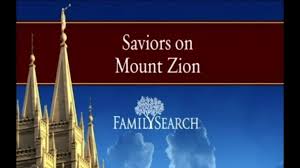Savior on Mount Zion Quotes

"Then, in a spirit of love and consecration, we must extend ourselves in the work of redemption of the dead through service in the temples of the Lord. This service more nearly approaches the divine work of the Son of God, who gave his life for others, than does any other work of which I know."
Gordon B. Hinckley - "He Slumbers Not, nor Sleeps" - "Ensign," May 1983, 8
"In our preexistent state … we made a certain agreement with the Almighty. … We agreed … to be not only saviors for ourselves but measurably, saviors for the whole human family. We went into a partnership with the Lord. The working out of the plan became then not merely the Father's work, and the Savior's work, but also our work."
John A. Widtsoe, Utah Genealogical and Historical Magazine, Oct. 1934, p. 189
"President Hunter's classic statement emphasizes the importance of temple work for our own families and helps us to understand the Old Testament prophecy that "saviours shall come up on mount Zion." (Obad. 1:21) This exalting service for others unseen is one of the most noble acts of human kindness."
Russell M. Nelson, CR, Oct. 1994, "The Spirit of Elijah"
Joseph Fielding Smith:
"But how are they to become saviors on Mount Zion? By building their temples, erecting their baptismal fonts, and going forth and receiving all the ordinances, baptisms, confirmations, washings, anointings, ordinations and sealing powers upon their heads, in behalf of their progenitors who are dead, and redeem them that they may come forth in the first resurrection and be exalted to thrones of glory with them; and herein is the chain that binds the hearts of the fathers to the children, and the children to the fathers, which fulfills the mission of Elijah..."
"Conference Report" - April 1948, p. 136
"This work, unselfishly given in behalf of those on the other side, comes nearer to the unparalleled vicarious work of the Savior than any other of which I know."
Hinckley, Ensign, Nov 1985, 53
"I think that vicarious work for the dead more nearly approaches the vicarious sacrifice of the Savior Himself than any other work of which I know. It is given with love, without hope of compensation, or repayment or anything of the kind. What a glorious principle."
President Gordon B. Hinckley (fireside in Birmingham, England, 29 Aug. 1995)
"We are not only to be messengers of salvation to the living, but saviors for our ancestors who went before us and who, though now dead, have paved the way whereby we might receive our present blessings... The promise was made that, even if they were born at a time and place where they could not hear the gospel preached in life, God would provide saviors for them from among their descendants. We are those saviors God promised through whom they can have every priesthood blessing."
Elder Theodore M. Burton, Ensign, May 1975
Becoming as Saviors to Our Departed Loved Ones
"President Hinckley has told us that 'just as our Redeemer gave His life as a vicarious sacrifice for all men, and in so doing became our Savior, even so we, in a small measure, when we engage in proxy work in the temple, become as saviors to those on the other side who have no means of advancing unless something is done in their behalf by those on earth' (Discourses of President Gordon B. Hinckley, Volume 2: 2000-2004 [2005], 265). "This is such meaningful service we give because our departed brothers and sisters literally become more connected to us."
Richard H. Winkel, "The Temple Is About Families," Ensign, Nov. 2006, 11